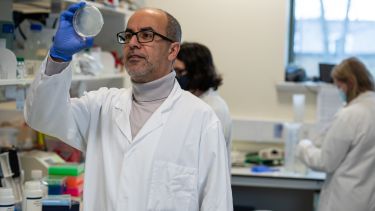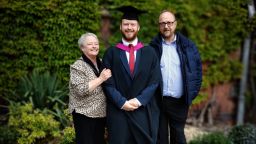Explore this course:
Applications for 2024 entry are now open. Apply now or register your interest to hear about postgraduate study and events at the University of Sheffield.
Clinical Neurology
School of Medicine and Population Health,
Faculty of Health

Course description
Lead academics: Dr Jon Wood and Dr Esther Hobson
This course gives students a detailed understanding of the human nervous system, neurological disease, and the treatments for these conditions. You will cover the fundamental science of neurological disease and bring this knowledge to life by attending NHS clinics to learn from patients and the clinicians treating them.
A range of conditions are covered, including cerebrovascular disease (stroke, epilepsy), neuroinflammation (multiple sclerosis, gluten ataxia) and neurodegeneration (dementia, motor neurone disease, Parkinson's, Huntington's). You’ll examine the biology and evidence base behind these conditions, find out how they are diagnosed and treated by clinicians, and learn from researchers who are developing cutting-edge new treatments such as gene therapy and stem-cell transplantation.
In practical sessions, you’ll critically analyse important research, explore the neuroanatomy of the central and peripheral nervous system in detail and talk to patients with neurological diseases about their experiences. You will also complete a NIHR Good Clinical Practice course, a requirement for any clinical researcher.
In your final term, you can choose from one of two routes:
Route A: Clinical Research Project
Students can complete a 15-week research project at the Royal Hallamshire Hospital or within the Sheffield Institute of Translational Neuroscience (SITraN), an internationally recognised centre of excellence for neuroscience research. Some students are involved in research with patients to understand their experience of their condition or the effects of treatments. Others conduct systematic reviews or data analysis or work with healthy volunteers.
Route B: Clinical Neurology Experiential Learning Module
Students spend 15 weeks placed within the neurology department of Sheffield Teaching Hospitals. They observe clinicians and patients at specialist clinics and on ward rounds, receive bedside teaching from experienced clinicians, and have the opportunity to take patients’ histories and conduct examinations. This route is only open to students who are working towards or already have a MBChB or equivalent degree. Currently, Route B provides sufficient experience to be recognised by the General Medical Council as a clinical attachment.
Modules
This is a 12-month, full-time course consisting of four taught module components worth 30 credits each undertaken during the autumn and spring terms.
Additionally, either a research project (Route A) or a Clinical Neurology Experiential Learning Module - CNELM (Route B) worth 60 credits is completed in the summer term.
- Applied Neuroanatomy and Clinical Neuroscience
-
Knowledge of the neuroanatomy of the central nervous system is fundamental to neuroscience. This module will combine a lecture series on basic and functional neuroanatomy, neuroimaging, peripheral neuroanatomy and basic neuroscience with practical demonstrations of the human brain and spinal cord using models and prosections. This will enable students to acquire an in-depth and critical understanding of functional neuroanatomy.
30 credits
Clinical Neurology requires the ability to critically analyse clinical research papers. This module will enable students to develop these critical research skills. - Cerebrovascular disease and disorders of consciousness
-
Cerebrovascular disease is a common cause of death and disability. In recent years, great progress has been made in both prevention and acute management of cerebrovascular disease. Epilepsy is a common cause of morbidity in individuals of all ages. Correctly characterising can be difficult as can identifying the most appropriate treatment. This module provides practical exposure to expert specialist clinics in conditions such as TIA, stroke and epilepsy, in combination with lectures covering key aspects of these disorders and recent research insights. The aim is to facilitate the students understanding how laboratory breakthroughs have been translated into clinical benefits for patients in the modern treatment of these conditions.
30 credits - Neuroinflammation (CNS) and diseases of the PNS
-
Inflammatory diseases of the nervous system are a common cause of disability, often in young people. In recent years, great progress has been made in elucidating the pathological mechanisms underlying neuroinflammation, which has led to new treatments and a better understanding of links with the neurodegenerative processes discussed in other modules. Non-inflammatory disorders of the peripheral nervous system will also be covered. This module provides practical exposure to expert specialist clinics in conditions such as multiple sclerosis, autoimmune ataxia, muscle disease and peripheral neuropathy, in combination with lectures summarising recent research insights. The module will also facilitate the students understanding how laboratory breakthroughs have been translated into clinical benefits for patients in the modern treatment of neuroinflammatory disease.
30 credits - Neurodegeneration
-
Neurodegenerative diseases increase in prevalence with age and as such are increasing rapidly with the ageing population. They result in a large number of years of disability and resulting burden on families, carers, health and social care costs. This module provides practical clinical teaching on diagnosis and management of these disorders. This is enhanced with exposure to expert specialist clinics, including those for motor neuron disease (MND), Parkinson's disease (PD), dementia and Huntington's disease. Additionally the student will have clinical tutorials and lectures on the pathophysiology underlying the selective neuronal loss in these conditions.
30 credits
In the third semester, students on Route A of the MSc in Clinical Neurology select a 60-credit clinical research project which can be (subject to availability):
- Without patient contact, ranging from systematic reviews to analysis of existing data sets.
- With patient contact, ranging from face-to-face interviews, and questionnaires to participating in new interventions.
A limited number of laboratory-based projects may be available, based at the Sheffield Institute for Translational Neuroscience (SITraN); a state-of-the-art translational neuroscience facility.
The research project is assessed from the written dissertation and research presentation. The project provides opportunities such as experiencing research first-hand, developing data collection and analysis skills, academic writing and presentation skills. Many students go on to present their work at conferences or be involved in improving care for patients.
60 credits
In the third semester, students on Route B of the MSc in Clinical Neurology take the 60-credit Clinical Neurology Experiential Learning Module (CNELM).
Please note, due to the limited places on this option, entry to this may be competitive.
Candidates undertaking the Clinical Neurology Experiential Learning Module [CNELM] are required to have or be studying for an MBChB or equivalent degree, to be eligible for registration with the GMC and to have completed a CRB check.
Students will spend 15 weeks immersed in the NHS neurology department at Sheffield Teaching Hospitals. They attend specialist clinics, and ward rounds and observe investigations, prescribing and NHS routines. They will have the opportunity to take histories and examinations under supervision. They will receive bedside teaching and support from an experienced clinician. The learning opportunities will be tailored according to the students’ interests.
The CNELM is assessed by means of a portfolio (50%) and a 6000-word dissertation (50%) on an aspect of the sub-speciality chosen for the module. The portfolio will contain a reflective log, anonymised details of cases seen and work-based assessments in line with postgraduate medical portfolios used in the NHS. Some doctors apply to have the CNELM recognised by the GMC as a clinical attachment and the CNELM provides an experience that has helped many obtain NHS jobs.
60 credits
The content of our courses is reviewed annually to make sure it's up-to-date and relevant. Individual modules are occasionally updated or withdrawn. This is in response to discoveries through our world-leading research; funding changes; professional accreditation requirements; student or employer feedback; outcomes of reviews; and variations in staff or student numbers. In the event of any change we'll consult and inform students in good time and take reasonable steps to minimise disruption.
Open days
An open day gives you the best opportunity to hear first-hand from our current students and staff about our courses.
Find out what makes us special at our next online open day on Wednesday 17 April 2024.
You may also be able to pre-book a department visit as part of a campus tour.Open days and campus tours
Duration
1 year full-time
Teaching
You will learn through lectures, seminars, tutorials and practical sessions.
Assessment
For most of your modules, you will be assessed by exams, essays, posters and presentations.
The Clinical Research Project (Route A) is assessed by a dissertation and presentation.
The Clinical Neurology Experiential Learning Module (Route B) is assessed by a portfolio including a reflective log, anonymised case discussions and work-based assessments, plus a dissertation (6,000 words).
Your career
This course gives graduates the knowledge, skills and experience for a wide range of specialist roles in healthcare.
Clinicians can use the course to develop sub-speciality experience in neurology. Some have joined the NHS Scientific Training Programmes in neurophysiology and audiology or gone on to train in other NHS roles such as as nurses and physician associates.
The course is also great preparation for a career in neuroscience and clinical research, and roles ranging from laboratory science to clinical trials. Many of our graduates go on to complete a PhD and work at top universities and research institutes. Others work as researchers in the healthcare industry or the NHS.
Student profiles
Entry requirements
For Route A: You need at least a 2:1 undergraduate honours degree in a relevant science subject (eg neuroscience, psychology, biomedical science, medicine) or an MBChB degree. We also accept medical students who wish to intercalate their studies. A 2:2 degree may be acceptable depending on an interview and assessment of your previous experience in areas related to the course.
For Route B: We require an MBChB degree, you will need to be an intercalating medic and you must be eligible for GMC registration.
All students will require a DBS check and honorary contract with Sheffield Teaching Hospitals (arranged on arrival).
Overall IELTS score of 6.5 with a minimum of 6.0 in each component, or equivalent.
If you have any questions about entry requirements, please contact the department.
Fees and funding
Apply
You can apply now using our Postgraduate Online Application Form. It's a quick and easy process.
Contact
Helen Hickson
clinneuro@sheffield.ac.uk
+44 114 222 2296
Any supervisors and research areas listed are indicative and may change before the start of the course.
Recognition of professional qualifications: from 1 January 2021, in order to have any UK professional qualifications recognised for work in an EU country across a number of regulated and other professions you need to apply to the host country for recognition. Read information from the UK government and the EU Regulated Professions Database.



